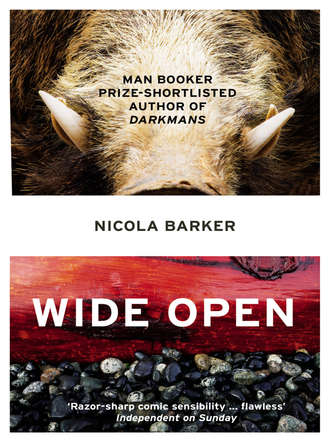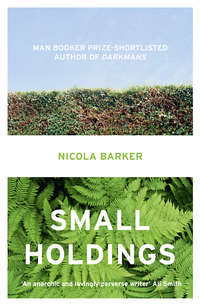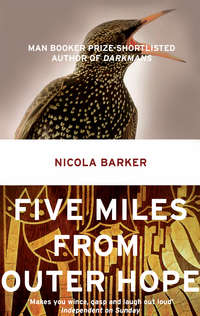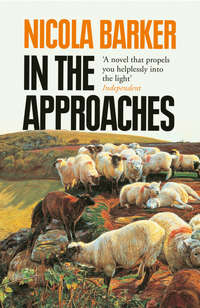
Полная версия
Wide Open

NICOLA BARKER
Wide Open

Dedication
I dreamed I saw you dead in a place by the water.
A ravaged place.
All flat and empty and wide open.
Contents
Cover
Title page
Dedication
1
Each day Ronny saw the same man waving. The man…
2
Laura had imagined herself to be in love with Nathan…
3
‘The water’s flat and brown. The sand’s made of shells.
4
No one else would do these jobs. It was like…
5
He drove home later than he’d anticipated and hit the…
6
Nathan told Margery before she’d even had the chance to…
7
‘Now here’s the thing,’ Ronny said, appraising Luke and detecting…
8
As far as Lily knew, her father, Ian, had been…
9
Jim found Ronny on the beach. Ronny was surrounded by…
10
Nathan had received three letters and he hadn’t responded to…
11
Lily couldn’t resist.
12
Remember Big Ron?
13
‘I was very surprised by your bathroom cabinet,’ Ronny said,…
14
Connie pressed her nose to the sheets of paper. They…
15
Sara walked the longest possible route for her own cautious…
16
The doctor was a family friend, naturally. And Connie knew,…
17
Ronny had been weaving around in the prefab’s open doorway,…
18
The longer it took for Sara to arrive home, the…
19
He was sick four times. The first time, up against…
20
Connie was sleeping. But not properly. Intermittently. And she was…
21
‘Ronny was sick four times,’ Lily shouted, like she was…
22
Lily was invincible. She placed one foot in front of…
23
Ronny, darling.
24
Nathan was rota’d on for the Sunday shift with Laura…
25
The car was the only thing Connie wasn’t selling. It…
26
The prison was like a set of dirty teeth, and…
27
Jim intended to subtly alter the pattern of his life.
28
Jim saw her – way off at first – from…
29
Margery noticed the change.
30
Lily got up from the kitchen table half way through…
31
Nathan returned the stolen book on Monday morning, but during…
32
Lily arrived in the kitchen dressed and ready for college…
33
Her armpit, her nose, her knees, her in-grown toenail.
34
‘Tell me again how you found it.’
35
‘I got some blood on the carpet. Sorry.’
36
Luke was pacing. He had a sheet of negatives in…
37
Margery pushed the door open and walked inside.
38
‘So did Luke get what he was after?’
39
‘I never realized before,’ Connie whispered, ‘how terrible the outside…
40
Lily refused to put the box into the boot or…
41
Jim approached the prefabs on numb, heavily sodden feet, wearing…
42
‘This was the spot,’ Lily said, interrupting the kind of…
43
To see Nathan like that, completely out of context. Nathan.
44
They faced each other like two spiteful, glimmering starlings across…
45
Ronny was no longer interested in what was happening outside.
46
They pulled up outside the farmhouse. Nathan killed the engine…
47
Jim awoke to the sound of the fridge door closing.
About the author
Other books by Nicola Barker
Praise
Copyright
About the publisher
1
Each day Ronny saw the same man waving. The man stood in the middle of a bridge, at its very centre point, but always looking outwards, facing away from London, never towards it. Ronny drove under that bridge in a borrowed car, a Volvo (the big bumpers reassured him), and into London along the A2 for three consecutive weeks. Every day, no matter what the time – he was working shifts, and by no means regular ones – the man stood on the bridge, waving.
He didn’t wave randomly. He picked out a car as a smudge on the horizon and then focused on that car alone, until it had passed from sight, until it had driven right under him. Until it had gone. Then he’d choose another car and the whole process would start over.
Ronny noticed that the man preferred white cars and yellow cars, that he never waved at red cars. Ronny’s car was green. He was waved at sometimes, but infrequently. He didn’t wave back.
Some days it rained. It was the tail end of summer. It was the beginning of winter. It was autumn, formally, but Ronny hated gradations. It wasn’t summer. Summer had gone. It wasn’t winter. Winter was frosty, traditionally, and it was nowhere near cold enough for frost yet. It was simply a wet time. The whole earth was sodden and weighted and clotted and terrible. It was raining. Always raining. But the man stood on the bridge and he waved, nonetheless.
On the last day, the final day of his three-week working stint, Ronny looked out for the man but saw that he was not waving. He was there, sure enough, but he was crouched over, hanging, it seemed, across the bar of the bridge. What was he thinking of? What was he doing? Ronny scowled and tried to keep his eyes on the road.
He didn’t want to stare, but his eyes kept shifting from the road to the bridge, from the road to the bridge. He indicated and then swung into the inside lane. He slowed down, inadvertently. A truck honked and jolted him out of his eye-high reverie.
He passed under the bridge and then out the other side. He checked his rear-view mirror. He couldn’t see anything. Why should he? He was on the wrong side now. He slowed down even further. Three cars overtook him. His foot touched the brake.
What was he doing? He didn’t want to stop but he found himself stopping. He pulled into the hard shoulder. He turned off the engine, unfastened his seatbelt, stepped out of the car, slammed the door shut behind him but didn’t pause to lock it. Instead he started off towards the bridge at a lively pace. His keys bumped and jangled against his thigh in his pocket.
He reached the embankment, drew breath for a moment and then began to climb. It was steep. The soil was damp. His shoes – white shoes – were muddied. He cursed.
Eventually he made it to the top. He clambered over the fence, crossed the road, and was finally able to see the waver up close. He felt an unexpected surge of gratification, as though this visual intimacy was something he’d longed for, only he hadn’t quite realized it.
At first glance the waver seemed fairly unexceptional. He had a beard and longish, tangled brown hair. He was pale. His clothes were shabby. He’d been crying.
Ronny drew closer. He stamped the mud off his shoes. ‘Is anything the matter?’
The man was bent double, was curled up like a dirty bandage, but he grew and grew like Jack’s beanstalk when Ronny spoke to him. He seemed to unfold, to unwind to his full height, which was considerable. Tall, Ronny thought, and thin. Ronny was thin too, but he felt much smaller.
‘Is something wrong?’
The man was standing now, and Ronny saw that he had not in fact been squatting before but sitting, on a small battered-looking cardboard box. He had his left hand cupped, and in his curved palm he held something.
‘What is that?’
The man answered, his voice nearly extinguished by the roar of the traffic below, ‘Come and see.’
Ronny drew closer still. He stared into the man’s hand. He inhaled sharply. The man’s fingers were shiny with scar tissue, but only on their tips, where they shone as smooth as wax, as pale as lard. Nestled in the centre of these strange fingers was a dirty palm. In the palm was a wasp.
‘A wasp,’ Ronny said softly. ‘What’s wrong with it?’
‘It was in a puddle. I should have left it but I saw it was still moving so I picked it up. I believed I could save it.’
Ronny stared at the wasp more fixedly. It was still alive. It moved, but only slightly. It seemed to be arching itself, the dainty waist between its black thorax and striped abdomen virtually snapping in two.
‘It’s been writhing,’ the man said, his voice – Ronny felt – ridiculously emotional.
‘It’s been in so much pain.’
Ronny adjusted the blue woollen hat he was wearing. He pulled it low over his eyebrows. He cleared his throat, cautiously. ‘I don’t think wasps feel pain,’ he said, anticipating a strong reaction.
The man glanced up, clearly indignant, his eyes, Ronny noticed, a wild cess-pit green, his cheeks drawn and hollow. ‘How can you know that?’
‘I don’t. I’m just guessing.’
‘Well you’re wrong. Look properly for a second and then try and tell me that it feels nothing.’
Ronny tried his best to look properly. The wasp stirred, only slightly, but it seemed to be shuddering. Its movements were small yet jagged and loose and horrible.
‘It’ll die in a minute,’ Ronny muttered, vaguely disquieted, withdrawing again and wishing he could ask the man why it was that he waved, but he didn’t because he fancied – quite correctly – that his timing might be off-kilter. The man continued to focus on the wasp.
Ronny inspected his watch. It was getting late.
‘I’ll be off then.’
The man was very quiet, seemed barely to breathe he was so intent on his vigil. Eventually he said, ‘I think he’s finally going.’
Ronny nodded and turned to leave. This was a private moment. He had no wish to intrude. He took several steps and then …
‘My God!’
He spun around, his heart racing. ‘What?’
‘The wasp!’
Ronny smiled weakly at his own faint-heartedness, but he stepped up again with no visible signs of resentment.
‘See?’
The man showed Ronny his hand. Ronny looked. The wasp was still. It was dead.
‘It’s dead.’
The man grunted, unimpressed. ‘I know it’s dead. But did you see the sting?’
‘The sting?’
The man pointed. ‘When it died it curled up, incredibly tightly, and then the sting came shooting out from the back there, the whole sting was revealed in that final moment.’
Ronny felt absurd but he bent forward anyway. Sure enough, he saw the sting.
‘I see it.’
‘There’s a wonderful logic to it sliding out like that,’ the man said, almost smiling. Ronny tilted his head. ‘What do you mean?’
‘He’s at rest. He’s surrendered. He’s finally given up his weapon.’
Ronny considered this for a while and then said, ‘No. I don’t see it that way at all.’
The man looked up. ‘You don’t? So how do you see it?’
‘Well …’ Ronny scratched his neck. ‘He’s a warrior. His weapon is drawn even in death. Especially in death. That’s the whole point of a wasp. He’s the kamikaze pilot of the insect world.’
The man smiled at this, he stared at Ronny intently, at his neat edges, his apparent cleanliness, his bright, pale face. Eventually he said, ‘That’s very funny.’
Ronny rubbed his nose, modestly.
‘But all the same …’ the man continued, ‘it’s not actually true. Only bees die when they sting. Wasps work differently. They’re tougher. He’s given up his weapon. That’s plainly how it is.’
Ronny didn’t agree but he merely shrugged. He found it hard to commit himself to disagreements.
The man was silent for a while. Ronny studied him. He seemed very young but his face was not a very young face. It was lined, vertically, and not in the places normal faces creased and wrinkled. It was as though he’d only just woken up from a hard sleep but his face hadn’t shaken it, hadn’t hurled off its sheets and its blankets yet to get on with the business of living.
He seemed ludicrously pliant and tractable, but singular. He seemed … Ronny shuddered at the thought … he seemed wide, wide open. But you couldn’t survive that way. Not in this world. Not for long. Ronny knew it.
In fact he prided himself on being shut right up. Like an oyster. Like a tomb. Like a beach-hut in winter; all bolted, all boarded. Like the bright lips of an old wound. Resolutely sealed.
‘Well, I think I’ll be going,’ he said finally, swallowing down his unease and then feeling it bob back up in his throat like a ballcock.
The man glanced at Ronny, but only quickly, as though he could barely stand to drag his eyes away from the dead wasp. ‘Today’s been worthwhile after all,’ he muttered. ‘You know? Just to get to see the wasp and the sting and everything.’
Ronny thought the man must be deranged but he nodded anyway.
‘Do you need another look before I bury him?’
‘Need?’ Ronny smiled. ‘No, I don’t think so.’
The man sighed. ‘He feels so hollow and light now that the life has gone. Before he had a kind of weight. Some gravity. But not any more.’
Ronny turned to go.
The man spoke again, a parting shot, it seemed, because as he spoke he also turned. ‘I’m Ronny.’
Ronny froze.
‘Ronny?’
The other Ronny stopped turning.
‘What?’
Ronny pointed to himself.
‘I’m Ronny too.’
They both paused.
‘Uh … actually,’ Ronny said, ‘I’m Ronald. How about you?’
The other Ronny shrugged, ‘I don’t know.’
‘We’re The Two Ronnies.’
The other Ronny didn’t get it. ‘What?’
‘Like in the comedy show.’
‘What comedy show?’
‘You don’t remember The Two Ronnies? The little one with glasses and the bigger, fatter one?’
The other Ronny shook his head. ‘No.’
‘Oh. I thought everybody knew about them.’
The other Ronny pointed at the wasp and said, ‘I think I’d better bury him.’ He started walking towards the edge of the bridge. He walked strangely. Ronny thought that this was because there was something wrong with his legs but then he realized that his shoes were several sizes too large. They were white shoes.
‘Excuse me …’
The other Ronny stopped walking. ‘What?’
‘We’re wearing the same shoes.’
The other Ronny peered down at his shoes. ‘These aren’t my shoes.’
‘Not yours? Then whose are they?’
‘I don’t know. I must’ve picked them up somewhere.’
Ronny drew closer to the other Ronny. ‘You know, it’s a rare thing to see someone in white shoes. And those shoes are special. They’re the kind I wear for work.’
The other Ronny frowned and looked down at his shoes a second time. ‘Maybe they are your shoes.’
Ronny squinted at this, baffled. ‘Pardon?’
‘I got them in Lost Property. Maybe you lost them and I picked them up. I’m called Ronny. So are you. Maybe the person on the desk got us confused.’
‘Lost Property?’
‘On the Underground. The tube. At Baker Street.’
Ronny let this sink in for a few seconds and then he said softly, ‘My brother works there.’
The other Ronny was clearly impressed. ‘Really? In the office?’
‘Yes.’
‘What’s he look like?’
‘Uh … reddish hair. Blue eyes. Quite short.’
The other Ronny grinned. ‘I know him.’
‘You’re kidding!’
‘Nope. That’s Nathan. I know him. I go in there all the time. Ever since I was a kid I’ve been going in there.’
‘What for?
‘I keep losing stuff.’
‘When was the last time you saw him?’
The other Ronny bit his lip. ‘Nathan? Uh … a month.’
‘How did he look?’
‘I think he looked fine.’
Ronny was clearly delighted, but he spoke with an element of restraint. ‘Well that’s good then.’
‘So …’ the other Ronny seemed genuinely interested, ‘when was the last time you saw him?’
‘Ten years ago.’
The other Ronny mulled this over for a while and then said, ‘I’ve got a whole family somewhere that I’ve never even met. Brothers and sisters. All lost.’
Ronny didn’t want to appear competitive so he laboriously adjusted his collar in an attempt to distance himself. ‘That’s a great pity,’ he said finally, ‘luckily I have no sisters.’
The other Ronny looked serious. ‘Yes, that is a relief.’
‘It is?’
Ronny was bemused. The other Ronny gazed up at the sky. It had begun to rain again. He turned his attention back to Ronny. ‘There’s this famous story about a man who meets someone purely by accident but the more they find out about each other the more they realize that they have things in common until finally they realize that they are the same person. I don’t know who wrote the story.’
Ronny took a deep breath. ‘It wasn’t a story. It was a play. It’s by Ionesco. And what happens is that the two men realize that they have the same life but that they are in fact different people.’
‘Oh. Right.’
The other Ronny suppressed a grimace. He was clearly dissatisfied with this piece of clarification.
‘Which makes the whole thing even more absurd.’ Ronny added, as an afterthought, ‘anyway …’ He pulled off his hat, ‘we don’t look alike.’
Without his hat Ronny resembled a king prawn, fully processed; legs gone, shell gone, ready for serving, soft and pink and pale and smooth. Pure and unadorned.
His was a gentle face, a complex mixture of blankness and fullness. He was plain as a boiled sweet, but his eyes were deep, complex and dark-ringed, and his lashless lids were swollen. His irises were the mellow, golden brown of raw cane sugar.
‘You’ve got no hair.’
‘No.’
‘Are you ill?’
‘Alopecia.’
It began raining harder. Ronny put his hat back on again. The other Ronny hunched up his shoulders to keep the rain from dripping down his neck. ‘Did you get here by car?’
Ronny nodded. ‘Green Volvo. I parked on the hard shoulder.’
‘That’s illegal.’
‘Yes.’
‘Unless you broke down.’
‘No. The car’s fine. I stopped because I thought you might be intending to jump.’
‘Me?’ The other Ronny looked flabbergasted. ‘From this bridge?’
Ronny felt embarrassed. To hide it he said quickly, ‘I’m on my way to work. I’m in Tottenham for a while.’
The other Ronny didn’t seem to register.
‘So …’ Ronny struggled, ‘uh … what’s in the box then?’
‘The box?’ The other Ronny looked down. ‘This box?’
‘Yes.’
The box was approximately a foot and a half square and firmly sealed with strong brown tape.
The other Ronny paused and then smiled. ‘My soul.’
‘Your soul?’ Ronny didn’t like this kind of talk. He didn’t like talk of souls.
Ronny smiled even wider. ‘I’m kidding.’
Then he added softly, without prompting and without feeling, ‘I used to live on Claremont Road. In a squat. Now it’s gone. They built a link road over it. So I decided to give myself up to the road. To many roads. And now I’m on the motorway. I’m trying to find out what I can get back from it. I’ve been waving from here for three weeks.’
Ronny was pleased to have had his first question answered at last. By way of recompense he said, ‘I live on the Isle of Sheppey. By the sea. Not the sea, really, the channel.’
The other Ronny nodded. ‘Yes, Sheppey.’
‘You know it?’ Ronny strained to think of reasons why a person would go to Sheppey.
‘Did you pass through to catch the ferry?’
‘No.’
‘Are you a keen birdwatcher?’
‘No.’
He paused for a moment. ‘Were you in prison there?’
The other Ronny smiled and said, ‘I know someone who lives there.’
Ronny checked his watch. ‘I’d better be off.’
He proffered the other Ronny his hand to shake. He wanted to seal this interlude, formally. He was pleased with it but he wanted it contained.
The other Ronny couldn’t shake his hand.
‘I can’t shake your hand,’ he said gently, ‘I’m still holding the wasp.’
‘So you’re left-handed,’ Ronny said, ‘like me.’
‘No. I’m right-handed, it’s just that I do everything with my left hand.’
‘Why?’
‘It’s one of my projects.’
Ronny was perplexed. He transformed his attempted shake into a little wave. ‘Well, it was nice to meet you.’
‘Yes.’
He headed over towards the embankment. He didn’t turn around again. If he had, he would have seen the other Ronny go and bury his wasp in the soil at the edge of the bridge and then construct, one-handed and with considerable difficulty, a small marker out of a lolly stick and a piece of dried grass. Next he would have seen him walk back to the centre of the bridge and wash his hands in a puddle.
When he’d completed his tasks, however, instead of returning to his original post, the other Ronny moved to the opposite side of the bridge, the side facing into London, and stood and gazed down the hard shoulder. He saw Ronny climb into his green Volvo, indicate, pull off.
He felt an impulse to wave but defeated it. Instead he touched the wrist of his right hand with his left hand as if expecting to find something there, but the wrist was bare. He smiled gently, peered over his shoulder towards the cardboard box, cleared his throat and then shoved his cold wet fingers deep into his pockets.
2
Laura had imagined herself to be in love with Nathan for the first three years of her five-year tenure in Lost Property. Truly in love. A dizzy, silly, confusing, confounding love. Love like a wave (foam tipped), a wall (straight up and down, solid, well-built), like a wheel (no beginning, no end), like a whale.
A giant love, in other words. A great big whopper of a love. Love. Secret and hairy and cinnamon-flavoured. A hot, sharp-shooting sherbert love. A mishy-mushy, hishy-hushy, splishy-sploshy kind of love.
But the love had been unreciprocated and now she couldn’t understand how she had felt it or what it had consisted of, how it had looked or tasted or smelled.
It had been lost, her love, it had been pushed into a file, into a drawer, under a table, into an old suitcase. It had fallen between the folds of a badly closed umbrella. Her love had become another piece of lost property, floating around the office, no one seeing it or caring about it, no one to claim it.
They went out for a drink together, twice, after work. Nathan liked her, clearly, but not in that way. Not enough. Then she found out that he was seeing someone else. A social worker called Margery. She thought Margery such an antiquated name. She thought Margery must be sixty years old with blue hair and a beard. But Margery actually looked like Glenda Jackson. Striking, short-haired and with teeth that needed containing, that needed a brace.
Nathan never mentioned Margery at work. Thank God. And so Laura, rejected Laura, stupid Laura, blonde-haired, green-eyed, snub-nosed little Laura had to force herself to be nice to him. And in the moist dankness of that niceness a worm of hatred unravelled itself. It slid about. It sniffed, blindly, in Nathan’s direction. It was soft and vile and slightly, very slightly, ever so, ever so slightly whiffy.
The worm turned. The love withered. And left behind in its stead were only suds and offal and litter and a nasty, dirty bath ring which encircled Laura’s heart and made all her deepest, sweetest sensations of yesteryear seem like something empty and ugly and pathetic.
Her love was a glob of phlegm on life’s high street. It was slippery and slimy and not especially useful. Her love was cancelled. It was all washed out. It was over. Over. Over.
Laura wanted to scorn Nathan, to reject and rebuff, but she was a sensible woman and she knew that he didn’t even have the first idea about all the things she’d been feeling, so what was the point?








